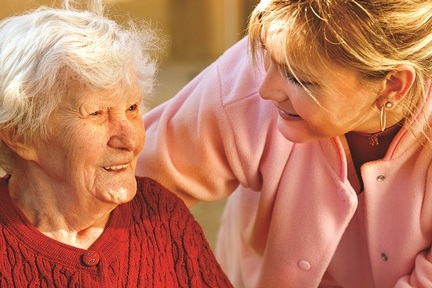Women globally bear the brunt of dementia - both as carers and living with the disease
Dementia disproportionately affects women all over the world, as women do most of the caring for people with dementia and are more likely to get the disease as they live longer, according to new research.

The report ‘Women and Dementia: A global research review’ published by Alzheimer's Disease International (ADI) and launched at The Alzheimer’s Show is the first official recognition that dementia affects women globally so much more than men.
In light of this research, ADI is urging all countries to address the disproportionate impact of dementia on women, and provide targeted support to better enable women to provide care and to feel cared for themselves.
Sixty-one per cent of people in Britain currently living with dementia are women and 39 per cent are men.
Women need more targeted support
Dr James Warner, medical director at Red & Yellow Care, which helped fund the study, said: “This review has demonstrated that women have a threefold greater risk of developing dementia than men and feel a greater strain from the condition especially from the experience of transitioning from being a carer throughout life to being the recipient of care.
“Therefore it’s important that women are offered smart solutions to address both the physical and psychological impact of the condition. In my experience this can be achieved by integrating health and social care, minimising the number of doors someone may need to go through to access care.”
Marc Wortmann, executive director of Alzheimer’s Disease International, called for “governments across the world to acknowledge that the challenges faced by women affected by dementia are part of the wider scope of women’s issues that need addressing, especially in low and middle income countries.
“We must take action immediately to develop public health and care policies that support women in all aspects of their dementia journey, whether it is as a caregiver or as someone living with dementia themselves,” he said.
Women expected to take on caring role
The report found there is a marked gender imbalance in dementia care and the contribution of women is taken for granted, with women usually expected to take on the main caring role.
ADI estimates that by 2050, 71 per cent of the 135m people with dementia will live in low and middle income countries. The vast majority of these people will be cared for at home, most likely by a female relative.
The report reveals worryingly that women all over the world are much less likely to access help and support than their male counterparts. This could be one of the factors as to why female carers have higher levels of burden, stress and depressive symptoms than male carers. Women are also more likely to reduce their working hours or give up work completely so they can care for their friend or relative.
Professor Dawn Brooker of the Association for Dementia Studies at Worcester University, who co-wrote the report, is concerned that “we are not picking up on the gender issue as we should be”.
She said: “The reality is that more women live with dementia, more women are family carers and more women make up the health and social care workforce.

“Dementia initiatives will impact on women differently from men and all policy makers need to be aware of this. This report underlines the fact that the increasing prevalence of dementia worldwide will have a significant impact on women worldwide and needs to be recognised at a family, community and policy level.”
As well as there being more women living with dementia, women are more likely to be carers of people with dementia, accounting for 60-70 per cent of all unpaid carers. Women are living longer than men so may face not having a partner to care for them.
“In the UK, we must raise the status of women in caring roles by providing carers with individualised specialist help from experts in the field on an ongoing basis and ensuring that they are more adequately rewarded and recognised,” said Dr Nori Graham, vice president of Alzheimer’s Disease International.
Woman's world
The news that dementia disproportionally affects women came as no surprise to dementia campaigner, Beth Britton. She said: “In the last nine years of my dad's life with dementia he was surrounded by women, most notably myself and my mum, but also my half-sister, fellow care home residents who were predominantly female, visitors to his three care homes who were mostly women, female care workers, nurses, doctors, physios, chefs, housekeeping staff, activity co-ordinators, entertainers and therapeutic practitioners.
“My dad could perhaps have been forgiven for feeling marginalised at times amongst the female laughter, endless chatter and delicately balanced emotional dispositions. Of course I wouldn't wish in any way to ignore the contribution men made to my dad's life, most notably my half-brother and my dad's key-worker, but also male residents and visitors (who were in a minority), and a few nurses and doctors, but it really was a woman's world.
“Such dedication from the numerous women around my dad enabled him to live as well as he could with his dementia for the last years of his life. I'm not sure whether women are drawn to caring roles because of maternal instincts to nurture and protect, but watching many of the women who supported my dad having children and showing their offspring the same tenderness they showed my dad often made me wonder if biologically women are just more likely to take on caring roles.”
Is longevity the only reason for more women than men having dementia?
The fact that more women have dementia than men has been linked to female longevity. However Ms Britton “suspects that isn't the whole story”.
She says “dementia is not a normal part of ageing” and would like to see a much greater exploration of the physiological and lifestyle aspects unique to women.
Ms Britton questions whether “female hormones, contraceptive treatments, the stresses of motherhood, working while maintaining family life and taking on multiple caring responsibilities all have a part to play in leaving women physically and mentally vulnerable to developing dementia?”
Dr Nori Graham believes that because women are used to multi-tasking with child bearing, domestic work and cooking and, arguably have better social skills and support networks than men, it has been taken for granted they will undertake most of the caring for people with dementia.
The problem is that they do so without complaining and often with remarkably little help and support. “Women are not good, or at least not as good as men, at finding others to help them or realising that sometimes they need a break”, she said.
“As a result women need much greater support and information about the condition and resources they can tap and they also need to be given the skills to access the help that is available in their communities. It is crucial for there to be recognition that all carers need individualised specialist help from dementia experts on an ongoing basis if they are to perform their roles as effectively as possible.
Care workers' wages may rise if more were men
She questions whether care staff would be so badly paid if most of them were men and says “I think not. Perhaps society should realise they only stand to benefit if the status of women in caring roles both in families and in the paid workforce is much more adequately rewarded financially and in status than is the case at the present time”.
She adds that the report “draws attention to the need for the world to sit up and pay attention to the plight of women everywhere so that their contribution is no longer taken for granted but is appreciated for the valuable resource it is”.
The report ‘Women and Dementia: A global research review’ was supported by grants from Red & Yellow Care and WomenAgainstAlzheimer’s and can accessed at the ADI website - http://www.alz.co.uk/women-and-dementia
Latest Features News
 25-Nov-19
2019 Election: Boris Johnson leaves social care in 'too difficult box' but Labour vows to end 'crisis'
25-Nov-19
2019 Election: Boris Johnson leaves social care in 'too difficult box' but Labour vows to end 'crisis'
 18-Oct-19
Podcast: Wendy Mitchell and dementia: 'My biggest fear is not knowing who my daughters are'
18-Oct-19
Podcast: Wendy Mitchell and dementia: 'My biggest fear is not knowing who my daughters are'
 27-Sep-19
Exclusive: Care minister backs care workers' call for time off to grieve and attend funerals
27-Sep-19
Exclusive: Care minister backs care workers' call for time off to grieve and attend funerals
 19-Sep-19
Podcast: Gyles Brandreth says poetry helps ward off dementia
19-Sep-19
Podcast: Gyles Brandreth says poetry helps ward off dementia
 30-Aug-19
Edinburgh Fringe funnyman joins comics facing toughest audience at care home gig
30-Aug-19
Edinburgh Fringe funnyman joins comics facing toughest audience at care home gig